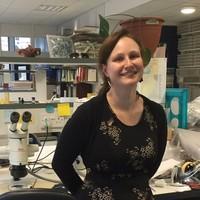
Jennifer Bates is an archaeobotanist with a special interest in the Indus Civilisation of South Asia. She has also worked on material from other regions and time periods including Haua Fteah (Libya, Palaeolithic), FRAGSUS (Malta, Neolithic), Must Farm (UK, Bronze Age), Montelabate (Italy, Etruscan and Roman) and Aşvan (Turkey, multiperiod). Jennifer is interested in the choices people make regarding their uses of plants and how this can reflect broader social, cultural and environmental issues. In order to explore this she uses macrobotanical remains (primarily charred seeds although she has experience in waterlogged, mineralised, and desiccated seeds, parenchyma and fibre finds) and phytolith analysis. She is developing familiarity with other microfossils.
Jennifer’s Indus research focuses on how we can address broader social, cultural and environmental questions such how societies were internally organised, how villages and cities interacted during periods of urbanisation and deurbanisation, what happens when cultures meet and interact, and how people reacted during periods of climatic instability, through analysis of the basic universal factor of life: food. Her PhD work (University of Cambridge) explored whether village life was affected by the rise and fall of urban centres in northwest India c.3200-1500BC. Using phytoliths and macrobotanical remains as part of the Land, Water, Settlement Project it explored how agricultural strategies, diet and crop processing strategies linked into bigger questions of social organisation and perceptions of climate change. Jennifer’s first post-doctoral project (Trevelyan Research Fellow, Selwyn College, University of Cambridge) expanded on these themes by reconstructing the dietary and agricultural activities of people on the borders of an urban civilisation to further our knowledge about ‘peripheral’ societies and how their daily lives were affected by social change.
Jennifer’s project at the Joukowsky will move back to look at villages within the Indus Civilization. The multi-proxy project ‘Life in Indus households: analysis of SPatial ACtivity Environments in villages in the Indus Civilisation of South Asia’ (SPACE) will creatively employ a range of microbotanical techniques (phytoliths and microcharcoal), faecal spherulites and geochemical analysis to investigate the variety of activities that could leave a signature in the surfaces of domestic spaces in the Indus Civilisation of South Asia (c.3200-1300BC). Rather than exploring social identity at the pan-civilization or site network scale, SPACE will look at how people used domestic spaces in individual households, drawing on materials from the TwoRains Project. This will be the first time the lived experience, the daily routine of Indus people, their taskscapes and how this intersects with questions of gender, age, wealth/status, ethnicity, or other factors of social identity will have been modelled within Indus archaeology.
